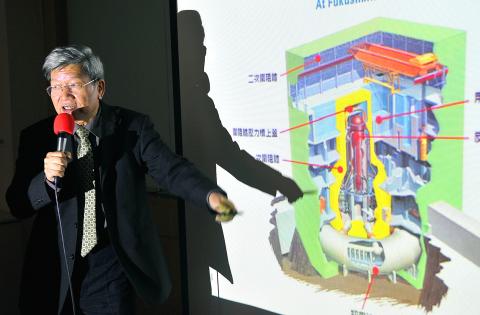A former government nuclear official yesterday said that Taiwan should abandon nuclear power because it is not capable of handling nuclear waste and its regulation of nuclear activity and radiation has been awful.
“People called me a nuclear expert with a conscience, a good person. Not that I am a good guy, but the fact is that [government officials in charge of nuclear affairs] are bad guys,” said He Li-wei (賀立維), a nuclear expert who used to work at the Atomic Energy Council’s Institute of Nuclear Energy Research.
In a seminar on nuclear risk assessment organized by several anti-nuclear civic groups, He, who holds a doctorate in nuclear engineering from Iowa State University, described himself as someone who was looking for redemption with his anti-nuclear efforts.

Photo: Chien Jung-fong, Taipei Times
He delivered a 30-minute briefing on Taiwan’s nuclear waste disposal predicament, saying that the nation’s nuclear power plants would consume 30,000kg of uranium over their 40-year lifespan, compared with the 1kg of uranium in the “Little Boy” atomic bomb that the US dropped on Hiroshima in 1945.
“By the time the three active nuclear power plants are decommissioned, they will have consumed more than 4,500 tonnes of uranium and we have no idea how to deal with the spent nuclear fuel,” he said.
Unlike Finland, which stores its nuclear waste 500m underground, the situation has been especially difficult for Taiwan, which neither has the technology to handle nuclear waste nor an appropriate storage location.
What is worse has been government officials’ lies about nuclear radiation levels on Lanyu (Orchid Island, 蘭嶼), where low-level nuclear waste is stored, and the government’s lack of transparency, He said.
He said the activities of the “nuclear power community” — including National Tsing Hua University’s nuclear engineering department, Taiwan Power Co (Taipower) and the council — as something akin to “organized crime” because the council has been awarding research projects to Tsing Hua professors or retired Taipower and nuclear power plant executives as favors. These people cover up the flaws in the nuclear power plants in return, he said.
The now retired He said many professors and government officials had been his students and he “should have flunked them in my class because scientists are supposed to speak the truth, not twist data or cover up mistakes.”
Two Japanese, Katsumi Nakao of J.F. Oberlin University and Yoh Kato of Tokyo Metropolitan University, also spoke at the seminar about the handling of the Fukushima Dai-ichi nuclear power plant disaster.

An essay competition jointly organized by a local writing society and a publisher affiliated with the Chinese Communist Party (CCP) might have contravened the Act Governing Relations Between the People of the Taiwan Area and the Mainland Area (臺灣地區與大陸地區人民關係條例), the Mainland Affairs Council (MAC) said on Thursday. “In this case, the partner organization is clearly an agency under the CCP’s Fujian Provincial Committee,” MAC Deputy Minister and spokesperson Liang Wen-chieh (梁文傑) said at a news briefing in Taipei. “It also involves bringing Taiwanese students to China with all-expenses-paid arrangements to attend award ceremonies and camps,” Liang said. Those two “characteristics” are typically sufficient

A magnitude 5.9 earthquake that struck about 33km off the coast of Hualien City was the "main shock" in a series of quakes in the area, with aftershocks expected over the next three days, the Central Weather Administration (CWA) said yesterday. Prior to the magnitude 5.9 quake shaking most of Taiwan at 6:53pm yesterday, six other earthquakes stronger than a magnitude of 4, starting with a magnitude 5.5 quake at 6:09pm, occurred in the area. CWA Seismological Center Director Wu Chien-fu (吳健富) confirmed that the quakes were all part of the same series and that the magnitude 5.5 temblor was

The brilliant blue waters, thick foliage and bucolic atmosphere on this seemingly idyllic archipelago deep in the Pacific Ocean belie the key role it now plays in a titanic geopolitical struggle. Palau is again on the front line as China, and the US and its allies prepare their forces in an intensifying contest for control over the Asia-Pacific region. The democratic nation of just 17,000 people hosts US-controlled airstrips and soon-to-be-completed radar installations that the US military describes as “critical” to monitoring vast swathes of water and airspace. It is also a key piece of the second island chain, a string of

The Central Weather Administration has issued a heat alert for southeastern Taiwan, warning of temperatures as high as 36°C today, while alerting some coastal areas of strong winds later in the day. Kaohsiung’s Neimen District (內門) and Pingtung County’s Neipu Township (內埔) are under an orange heat alert, which warns of temperatures as high as 36°C for three consecutive days, the CWA said, citing southwest winds. The heat would also extend to Tainan’s Nansi (楠西) and Yujing (玉井) districts, as well as Pingtung’s Gaoshu (高樹), Yanpu (鹽埔) and Majia (瑪家) townships, it said, forecasting highs of up to 36°C in those areas